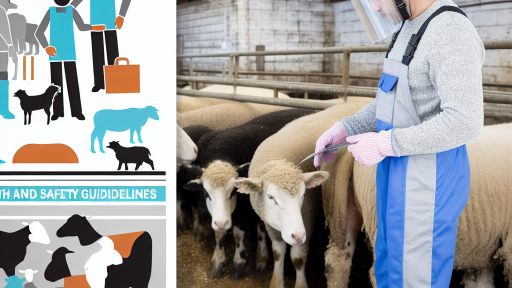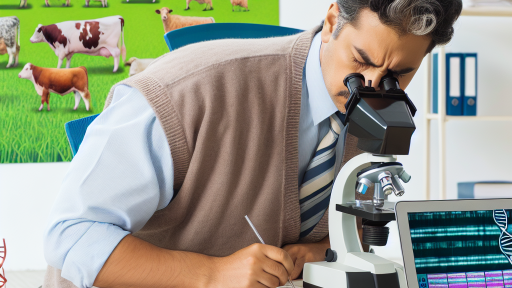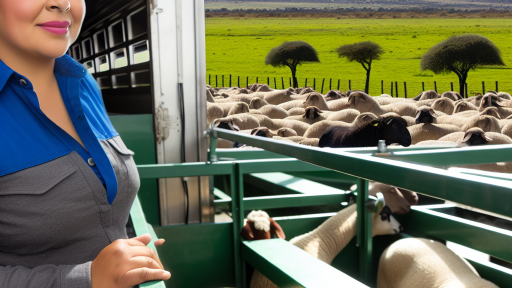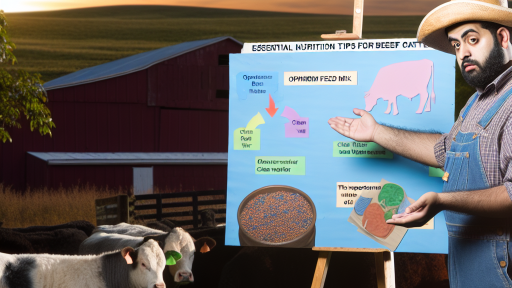Introduction to Genetic Factors in Livestock Fertility
Genetic factors significantly influence livestock fertility.
These factors determine reproductive efficiency in farm animals.
Understanding genetics helps in breeding programs.
Moreover, it allows farmers to select for desirable traits.
The Role of Genetics in Reproduction
Genetics play a critical role in reproductive physiology.
Certain genes affect hormone levels and ovarian function.
For example, specific alleles can enhance ovulation rates.
Additionally, genetic variation influences sperm quality in males.
Improving these traits can lead to higher conception rates.
Key Genetic Traits Impacting Fertility
- Ovarian response to hormonal treatments
- Sperm motility and morphology
- Fertility-related gene polymorphisms
- Maternal ability and calf viability
These traits are crucial for successful breeding outcomes.
Breeding Strategies for Enhanced Fertility
Selective breeding improves livestock reproductive performance.
Farmers use artificial insemination to propagate desired traits.
Genomic selection is also becoming increasingly popular.
This method accelerates genetic progress in herds.
As a result, it helps maintain genetic diversity while improving fertility.
Transform Your Agribusiness
Unlock your farm's potential with expert advice tailored to your needs. Get actionable steps that drive real results.
Get StartedEnvironmental Interactions with Genetics
Genetic potential is impacted by environmental factors.
Nutrition, housing, and climate can all affect fertility.
For instance, inadequate nutrition can hinder reproductive success.
Therefore, understanding these interactions is vital for optimization.
A holistic approach ensures genetic advantages are fully realized.
Overview of Livestock Fertility
Livestock fertility refers to the reproductive capacity of farm animals.
This aspect is crucial for sustainable livestock production.
It directly impacts herd size, production efficiency, and profitability.
Understanding fertility can help farmers make informed breeding decisions.
Definition of Livestock Fertility
Fertility denotes the ability of animals to conceive and produce offspring.
This includes both male and female reproductive capabilities.
High fertility rates are essential for maintaining herd health and productivity.
Importance of Livestock Fertility
Fertile livestock contribute to overall farm profitability.
They ensure a steady supply of meat, milk, and other products.
Moreover, enhanced fertility leads to better herd genetics.
Controlled breeding can accelerate the improvement of desirable traits.
Ultimately, successful livestock fertility strategies support food security.
Key Genetic Markers Influencing Reproductive Traits
Introduction to Genetic Markers
Genetic markers play a vital role in livestock reproduction.
These are specific sequences in the genome that indicate traits.
Scientists use them to identify desirable reproductive traits.
This identification helps improve breeding strategies effectively.
Identification of Fertility-Related Genes
Research has identified several key genes that influence fertility.
These genes affect reproductive performance in livestock species.
Common genes include the BMPR1B and GDF9 genes in sheep.
Showcase Your Farming Business
Publish your professional farming services profile on our blog for a one-time fee of $200 and reach a dedicated audience of farmers and agribusiness owners.
Publish Your ProfileMoreover, the IGF2 gene has shown significant effects in cattle.
Application of Genomic Selection
Genomic selection uses genetic information to improve breeding choices.
This method focuses on increasing genetic gain for reproductive traits.
Farmers benefit from higher accuracy in selecting superior animals.
Additionally, faster decision-making enhances overall productivity.
Significance of Marker-Assisted Selection
Marker-assisted selection aids in identifying and retaining valuable traits.
This approach allows breeders to make informed decisions.
By focusing on fertility markers, livestock populations improve steadily.
Consequently, this method increases herd performance over generations.
Challenges in Implementing Genetic Strategies
Despite progress, challenges still exist in genetic research.
One major issue is the complexity of reproductive traits.
Additionally, the environment also influences fertility outcomes.
Researchers are working to address these complications continuously.
Future Directions in Fertility Genetics
The future of livestock fertility genetics appears promising.
Advancements in technology will enhance genetic analysis further.
Incorporating artificial intelligence may improve selection processes.
Ultimately, these innovations will support sustainable farming practices.
Discover More: Crossbreeding vs. Purebreeding: Pros and Cons
The Role of Heritability in Livestock Fertility
Understanding Heritability
Heritability measures the extent to which genetics influence a trait.
In livestock, it relates directly to fertility rates.
This trait impacts breeding decisions and outcomes.
Impacts of Heritability on Fertility Rates
High heritability indicates strong genetic influence on fertility.
Animals with favorable genetic traits tend to produce more offspring.
Consequently, breeders select these animals to enhance fertility.
Factors Affecting Heritability
Several factors influence heritability in livestock.
- Genetic diversity within the population.
- The environment in which animals are raised.
- Management practices affecting animal care.
Genetic diversity contributes to the overall heritable traits in livestock.
A controlled and stable environment maximizes genetic potential.
Evaluating Heritability
Evaluating heritability involves rigorous statistical methods.
Breeders analyze pedigree data and performance records.
This data helps predict the potential success of breeding programs.
Improving Livestock Fertility through Genetics
Genetic selection enhances fertility, leading to improved productivity.
Breeding programs aim to incorporate desirable traits consistently.
Thus, livestock producers can achieve better reproductive outcomes.
Explore Further: Cost-Effective Beef Cattle Feeding Strategies
Impact of Genetic Diversity on Fertility Rates
Introduction to Genetic Diversity
Genetic diversity plays a critical role in livestock breeding programs.
This diversity enhances fertility rates among various livestock breeds.
It ensures a range of genetic material for sustaining healthy populations.
Consequences of Limited Genetic Diversity
Limited genetic diversity can lead to inbreeding depression.
Inbreeding decreases fertility rates and overall livestock viability.
Animals with low genetic variability may exhibit reproductive issues.
Showcase Your Farming Business
Publish your professional farming services profile on our blog for a one-time fee of $200 and reach a dedicated audience of farmers and agribusiness owners.
Publish Your ProfileConsequently, farmers face significant economic losses.
Importance of Genetic Variation
Genetic variation within a population fosters adaptability.
Adaptable livestock can cope better with environmental changes.
This adaptability directly correlates with improved fertility rates.
Furthermore, it encourages the resilience of livestock against diseases.
Strategies to Enhance Genetic Diversity
Selective breeding can improve genetic diversity in herds.
Farmers should introduce new genetic lines to reduce inbreeding.
Additionally, conservation of rare breeds promotes overall biodiversity.
Collaborative breeding programs can increase genetic variation effectively.
Impact on Reproductive Performance
Genetic diversity positively influences reproductive performance.
Animals with diverse genetics often have higher conception rates.
They also show increased survival rates for offspring.
Hence, maintaining genetic diversity is essential for reproductive success.
Importance of Investing in Genetic Diversity
Investing in genetic diversity is vital for sustainable livestock farming.
It enhances fertility rates and overall farm productivity.
Future breeding programs should prioritize genetic variation accordingly.
Gain More Insights: Integrating Aquaculture with Traditional Livestock Farming
The Intersection of Genomics and Fertility Improvement
Understanding Genetic Influence
Genetics plays a crucial role in livestock fertility.
Specific genes affect reproductive traits and outcomes.
These traits include ovulation rates, embryo survival, and sperm quality.
Consequently, understanding these genetic factors is vital for farmers.
Advancements in Genomics
Recent advancements in genomics provide valuable insights.
High-throughput sequencing techniques allow for more accurate genetic mapping.
This technology helps identify fertility-related genetic variations.
Moreover, genomic selection accelerates breeding programs significantly.
Key Genetic Markers for Fertility
Various genetic markers are associated with improved fertility in livestock.
- FSHR gene influences follicle-stimulating hormone receptors.
- STX1 gene affects sperm motility and function.
- IGF2 gene plays a role in embryo development.
Identifying these markers enhances selection strategies.
As a result, livestock can be bred for superior reproductive performance.
Challenges in Genetic Implementation
Despite advancements, challenges remain in implementing genetics in breeding.
Farmers may face difficulties in accessing genomic data and resources.
Additionally, interpreting genomic results can be complex.
Thus, collaboration with geneticists and breeders is essential.
The Role of Bioinformatics
Bioinformatics plays a critical role in livestock genetics research.
This field helps analyze large datasets generated by genomic studies.
Advanced software tools facilitate the identification of gene-environment interactions.
Consequently, this information assists in developing targeted breeding strategies.
Future Prospects in Livestock Breeding
The future of livestock breeding is promising with genomic advancements.
Enhanced understanding of fertility genetics leads to better reproductive outcomes.
Farmers can achieve more efficient breeding programs while improving livestock health.
Ultimately, this progress can contribute to sustainable agriculture.
Showcase Your Farming Business
Publish your professional farming services profile on our blog for a one-time fee of $200 and reach a dedicated audience of farmers and agribusiness owners.
Publish Your ProfileFind Out More: Harvesting Techniques to Maximize Yield in Fish Farms

Breeding Strategies to Enhance Genetic Traits for Fertility
Understanding Genetic Traits
Genetic traits play a crucial role in livestock fertility.
These traits influence reproductive performance and overall productivity.
Understanding these factors can help breeders make informed decisions.
Selection of Breeding Stock
Choosing the right breeding stock is essential for improving fertility.
Breeders should focus on individuals with high reproductive rates.
Additionally, selecting animals with fewer genetic disorders enhances fertility.
Using genetic testing can streamline this selection process.
Crossbreeding Techniques
Crossbreeding can introduce desirable traits into livestock populations.
This technique helps enhance genetic diversity and fertility rates.
For instance, hybrid vigor can lead to improved reproductive performance.
Implementing crossbreeding should be based on thorough research.
Use of Reproductive Technologies
Advanced reproductive technologies can significantly impact livestock fertility.
Artificial insemination allows for more targeted breeding choices.
Embryo transfer further maximizes genetic potential in breeding programs.
Moreover, cryopreservation of semen contributes to genetic diversification.
Monitoring and Evaluation of Breeding Outcomes
Regular monitoring of breeding outcomes provides valuable insights.
Evaluating reproductive success rates helps refine breeding strategies.
Detailed records of each breeding cycle aid in identifying patterns.
This information enables breeders to make data-driven decisions.
Collaboration with Geneticists
Partnering with geneticists enhances breeding programs’ effectiveness.
They provide expertise in genetic analysis and data interpretation.
Collaborative efforts can lead to the development of specialized breeding programs.
Furthermore, understanding genetic markers can improve fertility outcomes.
Case Studies of Successful Genetic Interventions in Livestock Fertility
Advancements in Dairy Cattle
In recent years, genetic advancements have greatly improved dairy cattle fertility.
The use of genomic selection has gained popularity among dairy farmers.
Farmers now can select bulls based on a detailed understanding of their genetic traits.
This approach leads to improved offspring fertility rates.
A case study in Wisconsin showed a 15% increase in conception rates.
Farmers utilized advanced genetic testing techniques to identify superior genetics.
Furthermore, these methods allowed for better herd management and culling practices.
Enhancements in Beef Cattle Reproduction
Beef cattle producers also benefit from genetic interventions.
For instance, a study in Texas documented significant success with artificial insemination.
The program implemented the use of genetically superior sires.
Farmers reported a substantial decline in calving intervals.
On average, the intervals decreased by two months.
As a result, producers achieved higher yields and improved profitability.
Swine Genetic Developments
Genetic interventions extend to the swine industry as well.
A notable success story comes from a large commercial pig farm in Iowa.
Implementing genetic selection has resulted in faster growth rates.
Showcase Your Farming Business
Publish your professional farming services profile on our blog for a one-time fee of $200 and reach a dedicated audience of farmers and agribusiness owners.
Publish Your ProfilePigs from selected lines reached market weight weeks earlier than their peers.
This genetic strategy also improved litter size by up to 20%.
Moreover, it enhanced the overall health and vitality of piglets.
Sheep Breeding Innovations
In sheep production, genetic improvements have shown similar success.
A breeding program in New Zealand focused on fertility traits.
By employing targeted genetic selection, farmers increased lambing rates significantly.
Some farms reported lambing rates exceeding 200% in specific breeds.
This program also emphasized feed efficiency in breeding choices.
Consequently, producers enjoyed lower feed costs and improved margins.
Impacts of Genetic Engineering
Beyond traditional selection, genetic engineering is reshaping livestock fertility.
A prominent research initiative in Australia explored gene editing technologies.
This research aimed to develop traits associated with reproductive efficiency.
Preliminary results demonstrate potential for enhanced fertility in various species.
Ethical considerations remain a vital aspect of these technological advancements.
Consequently, ongoing dialogue about sustainable practices is crucial.
Future Directions and Technologies in Fertility Genetics Research
Advancements in Genomic Technologies
Genomic sequencing is revolutionizing livestock fertility research.
Next-generation sequencing offers detailed insight into fertility-related genes.
This technology allows scientists to identify genetic markers associated with reproductive traits.
Additionally, CRISPR technology enables precise gene editing for enhancing fertility.
Researchers can now improve desirable characteristics in livestock quickly.
This process reduces the time needed for selective breeding.
Integration of Bioinformatics
Bioinformatics plays a crucial role in analyzing genomic data.
Advanced algorithms help uncover complex genetic interactions.
These insights lead to better predictions of fertility outcomes in livestock.
Moreover, machine learning enhances the processing of large datasets effectively.
This technology allows for targeted breeding strategies based on data-driven insights.
Application of Artificial Intelligence
Artificial intelligence is transforming livestock management practices.
AI algorithms assist in predicting reproductive performance across herds.
This technology enables farmers to make informed decisions regarding breeding choices.
Furthermore, AI can analyze behavioral data to optimize breeding timelines.
Ultimately, this innovation improves overall fertility rates in livestock populations.
Emphasis on Sustainable Practices
Sustainability is becoming a focal point in fertility genetics research.
Researchers explore environmentally friendly breeding methods.
This includes reducing the reliance on synthetic hormones for enhancing fertility.
Instead, they focus on breeding strategies that promote natural reproductive processes.
Such practices are essential for maintaining ecological balance and livestock welfare.
Collaboration Among Stakeholders
Collaboration between researchers and farmers is essential for success.
Active partnerships foster the sharing of knowledge and technological advancements.
Such interactions can lead to agile responses to emerging fertility challenges.
Furthermore, engaging with industry players enhances the practical application of research findings.
Showcase Your Farming Business
Publish your professional farming services profile on our blog for a one-time fee of $200 and reach a dedicated audience of farmers and agribusiness owners.
Publish Your ProfileThis collaborative effort aims to improve livestock fertility sustainably and efficiently.
Additional Resources
Guide for the Care and Use of Laboratory Animals, 8th edition …




